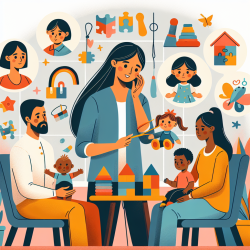The significance of play in a child's development cannot be overstated, especially for children with disabilities. In the groundbreaking research by Debora Jones-Prus, MA, Speech Pathologist, and Catherine Cavey, BSCOT, Occupational Therapist, titled "Play As An Interdisciplinary Treatment Tool," the role of play in therapy is explored from various angles, offering invaluable insights for practitioners.
The study presents two perspectives: one focusing on training parents of preschool language-delayed children, and the other on physically handicapped children in a kindergarten setting. Both perspectives emphasize the importance of play in stimulating development across sensory, motor, language, social, and imaginative skills.
For parents, the research underscores the value of using play strategies to foster their children's development. Strategies such as following the child's lead, commenting on experiences, and waiting for a verbal or physical response are highlighted. Additionally, the choice and use of appropriate play materials play a crucial role in this process.
In the kindergarten play group for physically handicapped children, the study details how play can be used to encourage choice-making, independence, and peer interaction. Through structured playtime, circle time, and fine motor activities, children demonstrated significant gains in cooperative and creative play, as well as increased independence.
The research advocates for an interdisciplinary approach to using play as a treatment tool, emphasizing the treatment of the whole child. This approach not only addresses the child's physical and linguistic needs but also nurtures their social and emotional development.
Key Takeaways for Practitioners:
- Integrating play into therapy can significantly enhance developmental outcomes for children with disabilities.
- Training parents to use play strategies effectively can amplify the benefits of therapy.
- An interdisciplinary approach, involving occupational therapy, speech pathology, and social work, can provide a holistic treatment model.
- Practitioners should focus on both interactive and physical strategies to stimulate development across multiple domains.
For therapists and educators, this research offers practical strategies to enrich therapy sessions and better support the development of children with disabilities. By embracing play as a multifaceted tool, practitioners can create more engaging and effective therapeutic interventions.
To read the original research paper, please follow this link: Play As An Interdisciplinary Treatment Tool.










